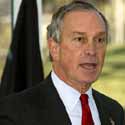
Who’s mad at Mayor Mike?
Let’s see: Smokers, standing on the sidewalk outside the bar in the endless spring rain trying to keep their cigarettes lit. The bartender, trying to keep track of which stools are really vacant and which need to be held for the smokers outside. The bar owner, paying triple his previous trash-collection cost because of stricter Dumpster rules.
The occupants of rent-stabilized apartments, whose monthly bills are going up as much as 8.5 percent. Homeowners, whose property tax already went up 18 percent. The homeless, who are being tossed out of scatter-site apartments.
The city’s wealthiest, stuck with an unprecedented 12 percent income-tax rate. The city’s poorest elderly, who won’t be getting free meals on weekends anymore.
Anyone who parked six inches too close to a fire hydrant and finds a $105 ticket glowing orange under his windshield-wiper blade.
The cops writing those tickets.
Firefighters, blasted as lazy by a deputy mayor and threatened with firehouse closings.
Public-school parents whose kids will continue to be squeezed into overcrowded classrooms.
Residents of blocks already strewn with Styrofoam peanuts and sticky soda cans who will see their garbage-collection schedule cut in half. Sanitation workers—the ones laid off and the ones left riding longer routes.
So Bloomberg’s happy electoral base is … nonsmoking, bike-riding private-school students?
It’s breathtaking how broadly Bloomberg has spread antagonism in a mere seventeen months in office. What’s stranger still is the civility of the rage.
Bitching about the mayor is a time-honored New York sport. What’s breathtaking is how broadly Bloomberg has spread the antagonism in a mere seventeen months in office. But what’s stranger still is the civility of the rage. Yes, thousands of protesters have marched on City Hall. And in a few pockets, like the offices of the teachers’ union, Bloomberg is actually hated. Otherwise, there’s a curious lack of passion to the bashing.
Last week, for instance, Bloomberg was the featured speaker at the 100th-anniversary dinner of the Building Trades Employers’ Association. The city’s heavy-construction industry is well into recession; major work at the World Trade Center site is at least three years away. Yet Bloomberg, tanned and trim, strode into Chelsea Piers and was greeted with a standing ovation. “This must be the 32 percent!” he joked, referring to his recent abysmal approval rating.
Between the speeches, the plumbers, steamfitters, and electricians scattered to smoke—outside, of course—and to grumble. “This is worse than the seventies,” said Jack Kittle, from the painters’ union. “And I don’t see any hope on the horizon.” Yet the complaining was oddly muted, and indicative of how the mayor is largely being forgiven for the city’s economic hard times. “Bloomberg was handed a plate of shit when he took office,” Kittle said. “So it’s not all his fault.”
All right, so Bloomberg didn’t create this fiscal disaster—but c’mon, this is New York! We do outrage better than this!
Curtis Sliwa shrugs. He is a connoisseur of vengeance and venting. The Guardian Angel turned foaming radio talk-show host is so right-wing you’d expect him to blast Bloomberg as a liberal elitist. Yet Sliwa praises the billionaire mayor’s ability to lower the volume in the ’hood. “In past crises, there’s always been a bitterness,” Sliwa says. “But now the city has a racial calm I’ve never seen before.”
Even the would-be Democratic challengers who’ve been emboldened by Bloomberg’s bad poll numbers can’t get any traction, especially since they’re trotting out tired populist lines. “The candidate who can win against Bloomberg is the candidate who best relates to the whole city, who understands the values and concerns of the neighborhoods in the outer boroughs,” says political consultant David Axelrod, who has advised Freddy Ferrer in the past and says he expects to again, perhaps in the 2005 mayoral campaign. “The next campaign is going to be about who can govern a city and connect with people. Freddy can reunite the city.” Yawn.
The mayor’s mysteriously unenthusiastic unpopularity makes his people, meanwhile, practically confident. They believe Bloomberg gets something more important than affection—grudging respect—for making unpleasant choices and keeping crime down. “Look, we know people don’t like him. We understand,” says Bill Cunningham, the mayor’s director of communications. “But it’s an interesting experiment. The media and the public are forever saying, ‘Politicians should ignore the polls and do what they believe.’ So if they really wanted an independent guy, who will do what’s right no matter what the critics say—you got him. The public doesn’t like the decisions the mayor has to make, but they believe in his honesty and his intelligence. I’ll take those core characteristics going into any election.”
Not that Bloomberg is completely above old-fashioned politicking: He’s showing his face outside City Hall more often, especially beyond Manhattan—an elementary school on Staten Island, a beach-opening ceremony at Coney Island—and lately Bloomberg seems welded to Ray Kelly, the beloved police commissioner. Entirely coincidental, Cunningham says.
So why aren’t we mad as hell? Perhaps New Yorkers are so savvy that we’re husbanding our hostility until August 2004, when President Bush arrives for the Republican convention. Yet something larger is keeping opinions of Bloomberg from soaring past annoyance to universal wrath. Bloomberg spoke to the construction-industry leaders hours after terrorists bombed Israel for the fifth time in two days, and with attacks in Morocco and Saudi Arabia still fresh news. No matter how angry New Yorkers are about day-to-day problems, the city’s mood remains tempered by the sense that far worse may be lurking. If all we’re arguing about in 2005 is race relations and jobs, we’re going to feel lucky. And “We like Mike!” won’t be a risible reelection slogan.